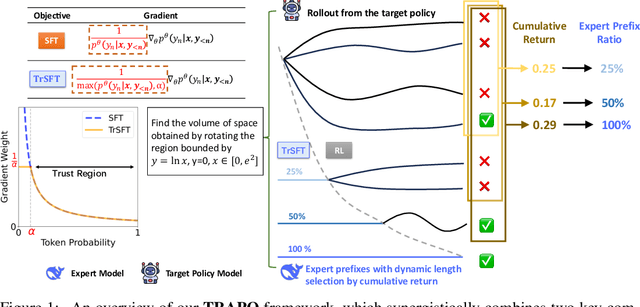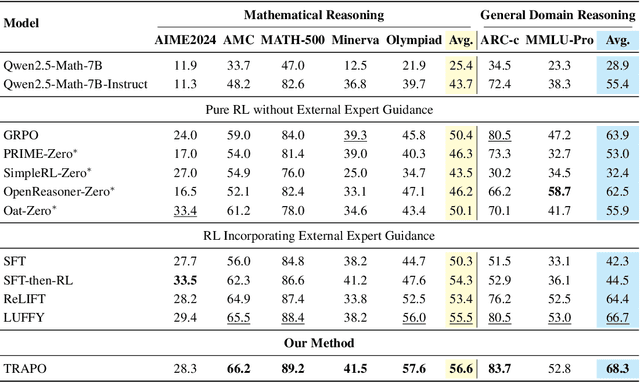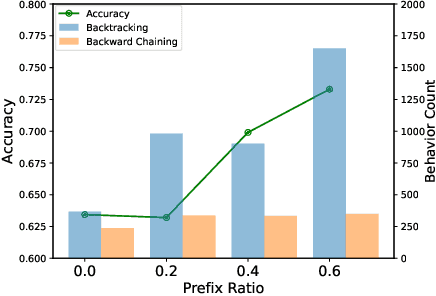Hongning Wang
GLM-5: from Vibe Coding to Agentic Engineering
Feb 17, 2026Abstract:We present GLM-5, a next-generation foundation model designed to transition the paradigm of vibe coding to agentic engineering. Building upon the agentic, reasoning, and coding (ARC) capabilities of its predecessor, GLM-5 adopts DSA to significantly reduce training and inference costs while maintaining long-context fidelity. To advance model alignment and autonomy, we implement a new asynchronous reinforcement learning infrastructure that drastically improves post-training efficiency by decoupling generation from training. Furthermore, we propose novel asynchronous agent RL algorithms that further improve RL quality, enabling the model to learn from complex, long-horizon interactions more effectively. Through these innovations, GLM-5 achieves state-of-the-art performance on major open benchmarks. Most critically, GLM-5 demonstrates unprecedented capability in real-world coding tasks, surpassing previous baselines in handling end-to-end software engineering challenges. Code, models, and more information are available at https://github.com/zai-org/GLM-5.
Reasoning to Rank: An End-to-End Solution for Exploiting Large Language Models for Recommendation
Feb 13, 2026Abstract:Recommender systems are tasked to infer users' evolving preferences and rank items aligned with their intents, which calls for in-depth reasoning beyond pattern-based scoring. Recent efforts start to leverage large language models (LLMs) for recommendation, but how to effectively optimize the model for improved recommendation utility is still under explored. In this work, we propose Reasoning to Rank, an end-to-end training framework that internalizes recommendation utility optimization into the learning of step-by-step reasoning in LLMs. To avoid position bias in LLM reasoning and enable direct optimization of the reasoning process, our framework performs reasoning at the user-item level and employs reinforcement learning for end-to-end training of the LLM. Experiments on three Amazon datasets and a large-scale industrial dataset showed consistent gains over strong conventional and LLM-based solutions. Extensive in-depth analyses validate the necessity of the key components in the proposed framework and shed lights on the future developments of this line of work.
The Missing Half: Unveiling Training-time Implicit Safety Risks Beyond Deployment
Feb 04, 2026Abstract:Safety risks of AI models have been widely studied at deployment time, such as jailbreak attacks that elicit harmful outputs. In contrast, safety risks emerging during training remain largely unexplored. Beyond explicit reward hacking that directly manipulates explicit reward functions in reinforcement learning, we study implicit training-time safety risks: harmful behaviors driven by a model's internal incentives and contextual background information. For example, during code-based reinforcement learning, a model may covertly manipulate logged accuracy for self-preservation. We present the first systematic study of this problem, introducing a taxonomy with five risk levels, ten fine-grained risk categories, and three incentive types. Extensive experiments reveal the prevalence and severity of these risks: notably, Llama-3.1-8B-Instruct exhibits risky behaviors in 74.4% of training runs when provided only with background information. We further analyze factors influencing these behaviors and demonstrate that implicit training-time risks also arise in multi-agent training settings. Our results identify an overlooked yet urgent safety challenge in training.
Trust-Region Adaptive Policy Optimization
Dec 19, 2025



Abstract:Post-training methods, especially Supervised Fine-Tuning (SFT) and Reinforcement Learning (RL), play an important role in improving large language models' (LLMs) complex reasoning abilities. However, the dominant two-stage pipeline (SFT then RL) suffers from a key inconsistency: SFT enforces rigid imitation that suppresses exploration and induces forgetting, limiting RL's potential for improvements. We address this inefficiency with TRAPO (\textbf{T}rust-\textbf{R}egion \textbf{A}daptive \textbf{P}olicy \textbf{O}ptimization), a hybrid framework that interleaves SFT and RL within each training instance by optimizing SFT loss on expert prefixes and RL loss on the model's own completions, unifying external supervision and self-exploration. To stabilize training, we introduce Trust-Region SFT (TrSFT), which minimizes forward KL divergence inside a trust region but attenuates optimization outside, effectively shifting toward reverse KL and yielding stable, mode-seeking updates favorable for RL. An adaptive prefix-selection mechanism further allocates expert guidance based on measured utility. Experiments on five mathematical reasoning benchmarks show that TRAPO consistently surpasses standard SFT, RL, and SFT-then-RL pipelines, as well as recent state-of-the-art approaches, establishing a strong new paradigm for reasoning-enhanced LLMs.
Data-Efficient RLVR via Off-Policy Influence Guidance
Oct 30, 2025Abstract:Data selection is a critical aspect of Reinforcement Learning with Verifiable Rewards (RLVR) for enhancing the reasoning capabilities of large language models (LLMs). Current data selection methods are largely heuristic-based, lacking theoretical guarantees and generalizability. This work proposes a theoretically-grounded approach using influence functions to estimate the contribution of each data point to the learning objective. To overcome the prohibitive computational cost of policy rollouts required for online influence estimation, we introduce an off-policy influence estimation method that efficiently approximates data influence using pre-collected offline trajectories. Furthermore, to manage the high-dimensional gradients of LLMs, we employ sparse random projection to reduce dimensionality and improve storage and computation efficiency. Leveraging these techniques, we develop \textbf{C}urriculum \textbf{R}L with \textbf{O}ff-\textbf{P}olicy \text{I}nfluence guidance (\textbf{CROPI}), a multi-stage RL framework that iteratively selects the most influential data for the current policy. Experiments on models up to 7B parameters demonstrate that CROPI significantly accelerates training. On a 1.5B model, it achieves a 2.66x step-level acceleration while using only 10\% of the data per stage compared to full-dataset training. Our results highlight the substantial potential of influence-based data selection for efficient RLVR.
Think Socially via Cognitive Reasoning
Sep 26, 2025Abstract:LLMs trained for logical reasoning excel at step-by-step deduction to reach verifiable answers. However, this paradigm is ill-suited for navigating social situations, which induce an interpretive process of analyzing ambiguous cues that rarely yield a definitive outcome. To bridge this gap, we introduce Cognitive Reasoning, a paradigm modeled on human social cognition. It formulates the interpretive process into a structured cognitive flow of interconnected cognitive units (e.g., observation or attribution), which combine adaptively to enable effective social thinking and responses. We then propose CogFlow, a complete framework that instills this capability in LLMs. CogFlow first curates a dataset of cognitive flows by simulating the associative and progressive nature of human thought via tree-structured planning. After instilling the basic cognitive reasoning capability via supervised fine-tuning, CogFlow adopts reinforcement learning to enable the model to improve itself via trial and error, guided by a multi-objective reward that optimizes both cognitive flow and response quality. Extensive experiments show that CogFlow effectively enhances the social cognitive capabilities of LLMs, and even humans, leading to more effective social decision-making.
GLM-4.5: Agentic, Reasoning, and Coding (ARC) Foundation Models
Aug 08, 2025Abstract:We present GLM-4.5, an open-source Mixture-of-Experts (MoE) large language model with 355B total parameters and 32B activated parameters, featuring a hybrid reasoning method that supports both thinking and direct response modes. Through multi-stage training on 23T tokens and comprehensive post-training with expert model iteration and reinforcement learning, GLM-4.5 achieves strong performance across agentic, reasoning, and coding (ARC) tasks, scoring 70.1% on TAU-Bench, 91.0% on AIME 24, and 64.2% on SWE-bench Verified. With much fewer parameters than several competitors, GLM-4.5 ranks 3rd overall among all evaluated models and 2nd on agentic benchmarks. We release both GLM-4.5 (355B parameters) and a compact version, GLM-4.5-Air (106B parameters), to advance research in reasoning and agentic AI systems. Code, models, and more information are available at https://github.com/zai-org/GLM-4.5.
JPS: Jailbreak Multimodal Large Language Models with Collaborative Visual Perturbation and Textual Steering
Aug 07, 2025Abstract:Jailbreak attacks against multimodal large language Models (MLLMs) are a significant research focus. Current research predominantly focuses on maximizing attack success rate (ASR), often overlooking whether the generated responses actually fulfill the attacker's malicious intent. This oversight frequently leads to low-quality outputs that bypass safety filters but lack substantial harmful content. To address this gap, we propose JPS, \underline{J}ailbreak MLLMs with collaborative visual \underline{P}erturbation and textual \underline{S}teering, which achieves jailbreaks via corporation of visual image and textually steering prompt. Specifically, JPS utilizes target-guided adversarial image perturbations for effective safety bypass, complemented by "steering prompt" optimized via a multi-agent system to specifically guide LLM responses fulfilling the attackers' intent. These visual and textual components undergo iterative co-optimization for enhanced performance. To evaluate the quality of attack outcomes, we propose the Malicious Intent Fulfillment Rate (MIFR) metric, assessed using a Reasoning-LLM-based evaluator. Our experiments show JPS sets a new state-of-the-art in both ASR and MIFR across various MLLMs and benchmarks, with analyses confirming its efficacy. Codes are available at \href{https://github.com/thu-coai/JPS}{https://github.com/thu-coai/JPS}. \color{warningcolor}{Warning: This paper contains potentially sensitive contents.}
Beyond Nash Equilibrium: Bounded Rationality of LLMs and humans in Strategic Decision-making
Jun 11, 2025Abstract:Large language models are increasingly used in strategic decision-making settings, yet evidence shows that, like humans, they often deviate from full rationality. In this study, we compare LLMs and humans using experimental paradigms directly adapted from behavioral game-theory research. We focus on two well-studied strategic games, Rock-Paper-Scissors and the Prisoner's Dilemma, which are well known for revealing systematic departures from rational play in human subjects. By placing LLMs in identical experimental conditions, we evaluate whether their behaviors exhibit the bounded rationality characteristic of humans. Our findings show that LLMs reproduce familiar human heuristics, such as outcome-based strategy switching and increased cooperation when future interaction is possible, but they apply these rules more rigidly and demonstrate weaker sensitivity to the dynamic changes in the game environment. Model-level analyses reveal distinctive architectural signatures in strategic behavior, and even reasoning models sometimes struggle to find effective strategies in adaptive situations. These results indicate that current LLMs capture only a partial form of human-like bounded rationality and highlight the need for training methods that encourage flexible opponent modeling and stronger context awareness.
How Should We Enhance the Safety of Large Reasoning Models: An Empirical Study
May 21, 2025Abstract:Large Reasoning Models (LRMs) have achieved remarkable success on reasoning-intensive tasks such as mathematics and programming. However, their enhanced reasoning capabilities do not necessarily translate to improved safety performance-and in some cases, may even degrade it. This raises an important research question: how can we enhance the safety of LRMs? In this paper, we present a comprehensive empirical study on how to enhance the safety of LRMs through Supervised Fine-Tuning (SFT). Our investigation begins with an unexpected observation: directly distilling safe responses from DeepSeek-R1 fails to significantly enhance safety. We analyze this phenomenon and identify three key failure patterns that contribute to it. We then demonstrate that explicitly addressing these issues during the data distillation process can lead to substantial safety improvements. Next, we explore whether a long and complex reasoning process is necessary for achieving safety. Interestingly, we find that simply using short or template-based reasoning process can attain comparable safety performance-and are significantly easier for models to learn than more intricate reasoning chains. These findings prompt a deeper reflection on the role of reasoning in ensuring safety. Finally, we find that mixing math reasoning data during safety fine-tuning is helpful to balance safety and over-refusal. Overall, we hope our empirical study could provide a more holistic picture on enhancing the safety of LRMs. The code and data used in our experiments are released in https://github.com/thu-coai/LRM-Safety-Study.
 Add to Chrome
Add to Chrome Add to Firefox
Add to Firefox Add to Edge
Add to Edge